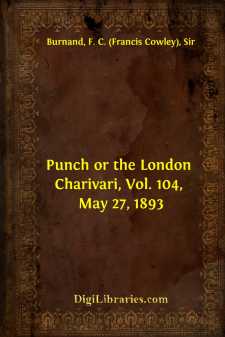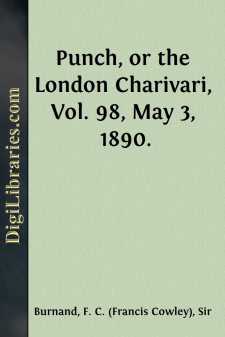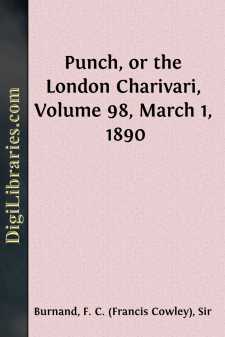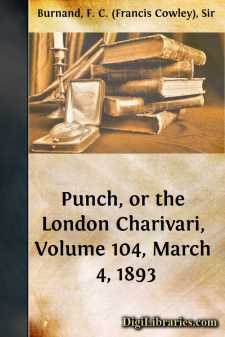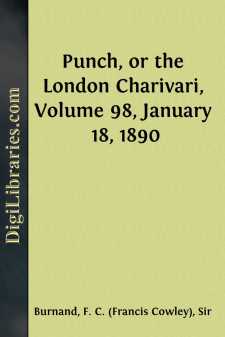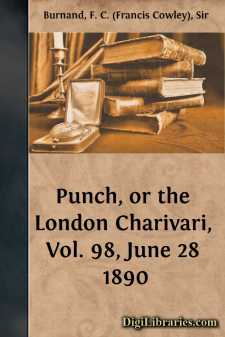Categories
- Antiques & Collectibles 13
- Architecture 36
- Art 48
- Bibles 22
- Biography & Autobiography 815
- Body, Mind & Spirit 144
- Business & Economics 28
- Children's Books 18
- Children's Fiction 14
- Computers 4
- Cooking 94
- Crafts & Hobbies 4
- Drama 346
- Education 58
- Family & Relationships 59
- Fiction 11834
- Games 19
- Gardening 17
- Health & Fitness 34
- History 1378
- House & Home 1
- Humor 147
- Juvenile Fiction 1873
- Juvenile Nonfiction 202
- Language Arts & Disciplines 89
- Law 16
- Literary Collections 686
- Literary Criticism 179
- Mathematics 13
- Medical 41
- Music 40
- Nature 179
- Non-Classifiable 1768
- Performing Arts 7
- Periodicals 1453
- Philosophy 65
- Photography 2
- Poetry 896
- Political Science 203
- Psychology 44
- Reference 154
- Religion 515
- Science 126
- Self-Help 85
- Social Science 82
- Sports & Recreation 34
- Study Aids 3
- Technology & Engineering 59
- Transportation 23
- Travel 463
- True Crime 29
F. C. (Francis Cowley) Burnand
Francis Cowley Burnand was a prominent English playwright and humorist, best known for his long association with the satirical magazine *Punch*, where he served as editor from 1880 to 1906. He wrote numerous plays and operas, including the successful burlesque "The Latest Edition of the White Cat" and the comic opera "The Chieftain" in collaboration with Arthur Sullivan. Burnand's work is noted for its wit and comedic brilliance, significantly influencing Victorian theatre and humor.
Author's Books:
Sort by:
The Chief Secretary's Musical Performance, with Accompaniment.—Mr. John Morley arrived last Friday at Kingston. He went to Bray. He was "accompanied" by the Under Secretary. Surely the Leader of the Opposition, now at Belfast, won't lose such a chance as this item of news offers. The "Water-Carnival."—Good idea! But a very large proportion of those whom the show attracts...
more...
SOME NOTES AT STARMOUTH. 3 p.m.—Arrive at Starmouth—the retired Watering-place at which I propose to write the Nautical Drama that is to render me famous and wealthy. Leave luggage at Station, and go in search of lodgings. Hotel out of the question—table d'hôte quite fatal to inspiration. On the Esplanade, noting likely places with critical eye. Perhaps I am a little fastidious. What I...
more...
MAY 3, 1890. No. X.—TOMMY AND HIS SISTER JANE.Once more we draw upon our favourite source of inspiration—the poems of the Misses Taylor. The dramatist is serenely confident that the new London County Council Censor of Plays, whenever that much-desired official is appointed, will highly approve of this little piece on account of the multiplicity of its morals. It is intended to teach, amongst other...
more...
STRAY THOUGHTS ON PLAY-WRITING. From the Common-place Book of The O'Wilde.—The play? Oh, the play be zephyr'd! The play is not the thing. In other words, the play is nothing. Point is to prepare immense assortment of entirely irrelevant epigrams. "Epigram, my dear Duke, is the refuge of the dullard, who imagines that he obtains truth by inverting a truism." That sounds well; must...
more...
"Though cold the coxcomb, and though coarse the boor, Though dulness haunts the rich and pain the poor, In this colossal city, Yet London is not Rome, O Shade!" I said. "A later Juvenal should not find her dead To purity and pity." "Satire, of shames and follies in sole quest, Is a one-eyed divinity at best," My guide responded, slowly. "The tale of Zoïlus hath its moral...
more...
A BALLAD OF WEALTHY WOOING. Ah, why, my Love, receive me With such tip-tilted scorn? Self-love can scarce retrieve me From obloquy forlorn; 'Twas not my fault, believe me, That wealthy I was born. Of Nature's gifts invidious I'd choose I know not which; One might as well be hideous As shunn'd because he's rich. O Love, if thou art bitter, Then death must pleasant be; I know not...
more...
MR. PUNCH'S DICTIONARY OF PHRASES.Journalistic."The Prisoner, who was fashionably attired, and of genteel appearance;" i.e., An ill-got-up swell-mobsman. "A powerful-looking fellow;" i.e., An awful ruffian. "A rumour has reached us"—(in the well-nigh impenetrable recesses wherein, as journalists, we habitually conceal ourselves). "Nothing fresh has transpired;"...
more...
First Well-informed Man. There hasn't been much in this debate on the Addresses. Second W. I. M. Oh. I don't know. They've promised a pretty big list of measures. How they're going to find time for the lot I can't make out. First W. I. M. (contemptuously). Yes, that's always the way with these Governments. They all talk mighty big at the beginning of the Session, and then,...
more...
No. III.—REALISATION. Scene—Theatre Royal, Blankbury, on the first night of the performance of the well-known Comedy of "Heads or Tails?" by the "Thespian Perambulators." Time, 7:50 P.M. A "brilliant and fashionable assemblage" is gradually filling the house. In the Stalls are many distinguished Amateurs of both Sexes, including Lady Surbiton, who has brought her husband and...
more...
At intervals of a few years the torpor of London Society is stirred by the carefully disseminated intelligence that a new planet has begun to twinkle in the firmament of fashion, and the telescopes of all those who are in search of novelty are immediately directed to the spot. Partially dropping metaphor, it may be stated that a hitherto unknown lady emerges, like the planet, from a cloud under which,...
more...


